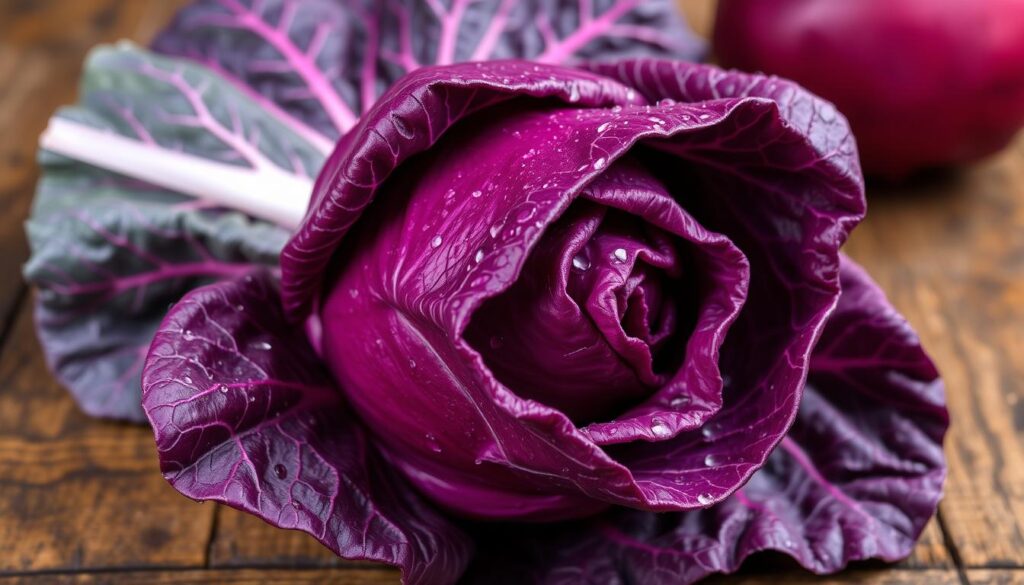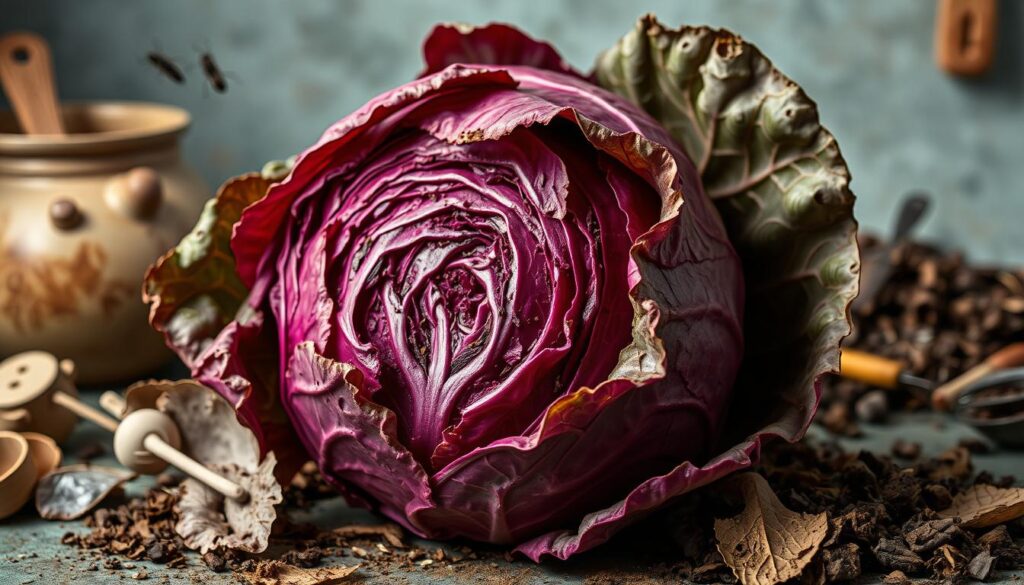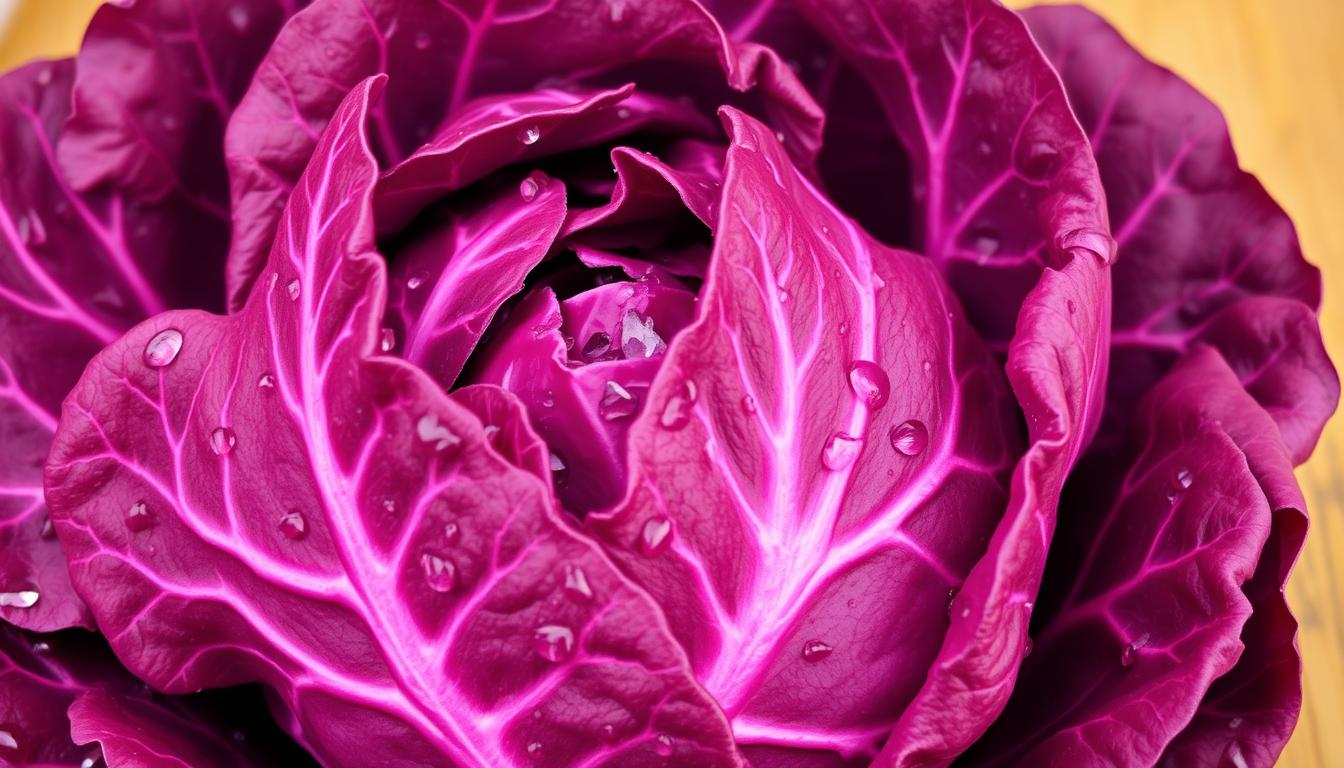Red cabbage is a vibrant, nutrient-rich veggie that’s become very popular. But, like any food, it has some downsides. This article will look at the potential negatives of adding red cabbage to your diet. We’ll cover digestive issues, thyroid concerns, and how it might interact with medications.
By knowing these possible drawbacks, you can decide if red cabbage fits into a healthy lifestyle for you.
Key Takeaways
- Red cabbage can cause digestive issues like flatulence and bloating in some individuals.
- It contains goitrogens, which may interfere with thyroid function, particularly in those with existing thyroid conditions.
- Red cabbage can interact with certain medications, such as anticoagulants and antiplatelets, leading to potential complications.
- The high oxalate content in red cabbage may be a concern for individuals with a history of kidney stones.
- Consuming red cabbage may impact blood sugar levels, requiring careful monitoring for those with diabetes or prediabetes.
Introduction to Red Cabbage
Red cabbage, also known as purple cabbage, is a vibrant and nutrient-dense vegetable. It belongs to the Brassica family of vegetables. This versatile vegetable has been grown for centuries, with roots in the Mediterranean region.
Red cabbage comes in various shapes, sizes, and shades. It adds a striking visual element to any dish.
Origins and Varieties of Red Cabbage
Red cabbage is a staple in many cuisines worldwide. Different regions have developed unique varieties. Eastern Europe has deep burgundy-hued heads, while the Mediterranean has vibrant, reddish-purple cabbages.
This vegetable is loved in diverse culinary traditions.
Nutritional Profile and Health Benefits
What makes red cabbage so good for us? Red cabbage nutrition is packed with vitamins, minerals, and antioxidants. It’s rich in vitamin C, vitamin K, and fiber.
These nutrients support overall well-being. The health benefits of red cabbage include heart health, fighting inflammation, and boosting the immune system.
| Nutrient | Amount per 1 cup (89g) of raw red cabbage |
|---|---|
| Vitamin C | 51 mg (85% of the Daily Value) |
| Vitamin K | 62 μg (52% of the Daily Value) |
| Fiber | 3 g (11% of the Daily Value) |
| Folate | 28 μg (7% of the Daily Value) |
| Manganese | 0.2 mg (9% of the Daily Value) |
With its vibrant color and nutritional profile, red cabbage is a superfood. It’s versatile in cooking and offers health benefits. It’s a great addition to any balanced diet.

Potential Drawbacks of Red Cabbage
Red cabbage is known for its nutrients and health benefits. Yet, it’s good to know its potential downsides. Knowing these can help you eat it in a healthy way.
One issue with red cabbage is its effect on digestion. Its high fiber can cause bloating, gas, and diarrhea. This is more common in people with sensitive stomachs or digestive problems.
Red cabbage might also affect your thyroid. It has goitrogens, which can mess with thyroid hormone production. This is a worry for those with thyroid issues like hypothyroidism.
| Potential Downsides of Red Cabbage | Description |
|---|---|
| Digestive Issues | The high fiber content in red cabbage can lead to bloating, gas, and diarrhea in some individuals. |
| Thyroid Concerns | Red cabbage contains goitrogens, which can interfere with thyroid hormone production, particularly for those with thyroid disorders. |
| Medication Interactions | Red cabbage may interact with certain medications, such as anticoagulants and antiplatelets, potentially altering their effectiveness. |
| Oxalate Intake | Red cabbage is a high-oxalate food, which can be a concern for individuals with a history of kidney stones or other oxalate-related health issues. |
| Blood Sugar Impacts | The carbohydrates in red cabbage may affect blood sugar levels, particularly for those with diabetes or pre-diabetes. |
| Allergic Reactions | Some individuals may be allergic to red cabbage, leading to adverse reactions such as skin rashes, hives, or digestive upset. |
The downsides of red cabbage can differ for everyone. How it affects you depends on your health, any conditions you have, and how much you eat. Always talk to a doctor before changing your diet, especially if you have health issues.

Knowing the negatives of red cabbage helps you use it wisely. You can add it to your diet in a way that suits your health and taste.
What are the Negatives of Red Cabbage?
Red cabbage is known for its nutritional value and health benefits. Yet, it can cause some issues for some people. Digestive problems and flatulence are common concerns.
Digestive Issues and Flatulence
Red cabbage is a cruciferous vegetable. It has a lot of dietary fiber and compounds that can be hard to digest. This can cause gas, bloating, and discomfort for those with sensitive stomachs or digestive issues.
To lessen these red cabbage digestive problems and red cabbage gas and bloating, start with small amounts. Also, make sure to chew it well. This helps with digestion.
- Cruciferous vegetables like red cabbage contain high amounts of fiber and compounds that can be difficult to digest for some people.
- Consuming red cabbage may lead to increased gas, bloating, and discomfort for those with sensitive digestive systems.
- Introducing red cabbage slowly and chewing it thoroughly can help minimize red cabbage digestive problems and red cabbage gas and bloating.
“Incorporating red cabbage into your diet can be a nutritious choice, but it’s essential to be mindful of your body’s reaction and adjust your consumption accordingly.”
Thyroid Concerns and Goitrogens
Red cabbage, like other cruciferous vegetables, has compounds called goitrogens. These can affect the thyroid gland’s function. Goitrogens block iodine uptake, which is key for thyroid hormones. This is a worry for those with thyroid issues like hypothyroidism or Graves’ disease.
Research links breakdown products of glucosinolates in red cabbage to health effects. Isothiocyanates, for example, can have both good and bad effects on the thyroid. This shows the complex relationship between red cabbage compounds and thyroid health.
People with thyroid problems might want to eat less red cabbage. Or they should talk to a doctor first. The goitrogenic properties of this veggie could make their condition worse.
| Compound | Effect on Thyroid |
|---|---|
| Glucosinolates | Can interfere with iodine uptake and thyroid hormone production |
| Isothiocyanates | May have both negative and positive effects on thyroid health |
Knowing the risks of goitrogenic substances like those in red cabbage is key. This is especially true for those with thyroid issues. Talking to a healthcare professional can help figure out how much red cabbage is safe to eat for thyroid health.
Potential Interactions with Medications
Red cabbage is a vibrant, nutrient-rich veggie. It can interact with some medications. This is especially true for anticoagulant and antiplatelet drugs like warfarin, aspirin, and clopidogrel.
Anticoagulant and Antiplatelets Interactions
Red cabbage is packed with vitamin K, key for blood clotting. This can be a problem for those on blood-thinning meds. These meds aim to prevent blood clots and thin the blood.
Consuming red cabbage can affect how well these meds work. This might raise the risk of bleeding or dangerous blood clots.
People on these meds should talk to their doctors before eating more red cabbage. They might need to adjust their meds to stay safe and healthy.
| Medication Type | Potential Interaction with Red Cabbage |
|---|---|
| Anticoagulants (e.g., warfarin) | The high vitamin K content in red cabbage can interfere with the blood-thinning effects of these medications, potentially increasing the risk of blood clots. |
| Antiplatelets (e.g., aspirin, clopidogrel) | Red cabbage’s ability to affect blood clotting may diminish the effectiveness of these medications, which are designed to prevent platelet aggregation and reduce the risk of heart attack or stroke. |
It’s vital for those on these meds to check with their doctors before changing their red cabbage intake. This way, they can manage their health safely and effectively.
Red Cabbage and Oxalate Intake
Red cabbage is a nutritious and versatile vegetable. But, it’s important to watch its oxalate content. Oxalates can bind to minerals like calcium, forming crystals that might be a problem for some people.
For those who need to watch their oxalate intake, eating less red cabbage and other high-oxalate foods is a good idea.
Cruciferous vegetables, like red cabbage, have moderate oxalate levels. The amount can change based on the variety and how it’s grown. Some studies say red cabbage has about 10 to 40 milligrams of oxalates per 100 grams of raw vegetable.
If you’re at risk for kidney stones or have been told to eat less oxalates, be careful with red cabbage. Talking to a healthcare professional or registered dietitian can help figure out how much is safe for you.
“Individuals with a history of kidney stones or other health conditions that may be affected by oxalate intake should discuss the appropriate consumption of red cabbage and other high-oxalate foods with their healthcare provider.”
Knowing about the oxalate in red cabbage and other foods helps you make better choices. This way, you can manage your oxalate intake as needed.
Impact on Blood Sugar Levels
Red cabbage is a healthy veggie, but it can affect blood sugar because of its carbs. This is important for people with diabetes or those watching their blood sugar. Eating too much red cabbage can make blood sugar levels go up and down, which is a worry for some.
Managing Blood Sugar with Red Cabbage
To lessen the effect of red cabbage on blood sugar, keep an eye on your levels. Eating it in small amounts, as part of a healthy diet, can help control blood sugar better.
Here are some tips for managing blood sugar when eating red cabbage:
- Watch your blood sugar levels closely, especially after eating red cabbage.
- Eat red cabbage in moderation, as part of a balanced, low-glycemic meal plan.
- Pair red cabbage with protein-rich foods to slow down carb absorption and keep blood sugar stable.
- If you have diabetes or are sensitive to blood sugar changes, talk to your doctor about how much red cabbage is safe for you.
By being aware of red cabbage’s effect on blood sugar and managing it, you can enjoy its nutritional benefits. This way, you can keep your blood sugar levels healthy.
“Moderation is key when it comes to incorporating red cabbage into the diet for those concerned about blood sugar levels.”
Allergic Reactions and Sensitivities
Some people might have allergic reactions or sensitivities to red cabbage. Symptoms can be skin rashes, hives, trouble breathing, or stomach issues. If you have food allergies or sensitivities, be careful when trying red cabbage. Watch for any bad reactions.
If you think you’re allergic to red cabbage, stop eating it and talk to a doctor. Getting the right diagnosis and treatment is key to staying healthy.
Red cabbage is good for you, but watch out for allergies or intolerances. Listen to your body and enjoy red cabbage safely.
